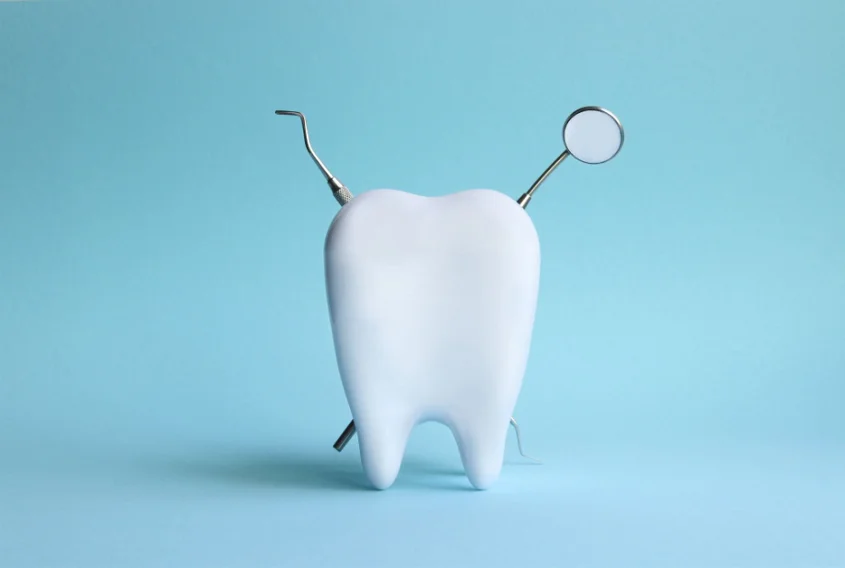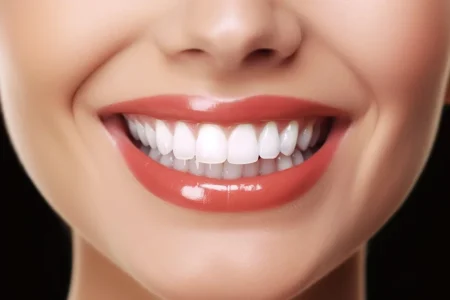Exposed Nerves in Teeth: Causes and Prevention
- Updated on: Feb 29, 2024
- 5 min Read
- Published on Jun 7, 2023

Exposed nerves in teeth refer to a dental condition where the sensitive, innermost part of a tooth, known as the pulp, becomes exposed. The pulp is a soft tissue composed of nerves and blood vessels that runs from the crown of the tooth to the tip of its roots. When the pulp is exposed, it can cause significant pain and discomfort, as well as other dental problems.
Discussing exposed nerves in teeth is important because this condition can have serious consequences for dental health and overall well-being. When the pulp becomes exposed, it can lead to infection, decay, and even tooth loss if left untreated. Furthermore, exposed nerves in teeth can cause significant pain and discomfort, which can impact a person’s daily activities and quality of life. By understanding the causes, symptoms, and prevention strategies for exposed nerves in teeth, individuals can take steps to protect their dental health and prevent complications.
Anatomy of a Tooth
To understand exposed nerves in teeth, it is important to have a basic understanding of tooth anatomy. Teeth are composed of several layers, including the enamel, dentin, and pulp. Enamel is the hard, outer layer that covers the crown of the tooth. Dentin is a softer layer beneath the enamel that makes up the bulk of the tooth. The pulp is located at the center of the tooth, and it contains nerves and blood vessels that provide nourishment and sensation to the tooth.
The nerve in a tooth is composed of specialized cells called neurons that transmit electrical impulses to and from the brain. These neurons are bundled together and surrounded by connective tissue, forming a nerve fiber. The nerve fiber extends from the pulp chamber to the tip of the tooth root, where it connects with the nerves of the surrounding tissues. When the pulp becomes exposed, it can cause the nerve to become irritated, leading to pain and discomfort. Understanding the structure and function of tooth nerves can help individuals better understand the causes and consequences of exposed nerves in teeth.
Causes of Exposed Nerves in Teeth
Exposed nerves in teeth occur when the protective layer of enamel and dentin is compromised, exposing the underlying nerve tissue to external factors.
There are several causes of exposed nerves in teeth, including:
A. Tooth Decay and Cavities
Tooth decay and cavities are the leading causes of exposed nerves in teeth. When bacteria accumulate on the surface of the teeth, they produce acid that erodes the enamel and dentin, leading to the formation of cavities. If left untreated, the decay can progress to the nerve tissue, causing an exposed nerve.
B. Gum Disease
Gum disease is a common dental problem that affects the supporting tissues of the teeth. When bacteria accumulate on the gums, they cause inflammation and infection, which can lead to the destruction of the gum tissue and bone. As a result, the roots of the teeth become exposed, leading to an exposed nerve.
C. Trauma or Injury
Trauma or injury to the teeth can also cause an exposed nerve. This can occur due to a fall, sports injury, or accident. When the teeth are traumatized, the enamel and dentin can become chipped or fractured, exposing the nerve tissue.
D. Teeth Grinding or Clenching
Teeth grinding or clenching, also known as bruxism, can cause an exposed nerve. This habit can wear down the enamel and dentin, leading to the exposure of the nerve tissue. Additionally, bruxism can cause muscle soreness and tension headaches.
E. Aging and Wear and Tear
As we age, our teeth naturally experience wear and tear. Over time, this can lead to the thinning of the enamel and dentin, making the teeth more susceptible to damage and decay. In some cases, the wear and tear can lead to an exposed nerve.
Symptoms of Exposed Nerves in Teeth
The symptoms of exposed nerves in teeth can range from mild to severe and may include:
A. Sensitivity to Hot and Cold Temperatures
Exposure of the nerve tissue can cause sensitivity to hot and cold temperatures, making it uncomfortable to eat or drink certain foods and beverages.
B. Pain and Discomfort
Exposed nerves in teeth can cause severe pain and discomfort, which may be sharp or dull in nature. The pain can be triggered by eating, drinking, or even breathing in cold air.
C. Swelling and Inflammation
Swelling and inflammation may occur around the affected tooth, which can make it difficult to open the mouth or speak.
D. Discoloration or Darkening of the Tooth
An exposed nerve may cause the affected tooth to appear discolored or darkened. This is due to the death of the nerve tissue, which can cause the tooth to lose its natural color.
Prevention of Exposed Nerves in Teeth
Here are some tips which help in preventing your teeth from exposed nerves in teeth.
Proper Oral Hygiene Practices
Practicing proper oral hygiene is the key to preventing many dental problems, including exposed nerves in teeth. Brushing at least twice a day, flossing regularly, and using mouthwash can help remove plaque and bacteria from the teeth and gums. It is important to use the right technique when brushing and flossing to ensure that all areas of the mouth are cleaned effectively.
Regular Dental Check-Ups and Cleanings
Regular dental check-ups and cleanings are important for maintaining good oral health and preventing dental problems. During a dental check-up, a dentist can identify any signs of tooth decay, gum disease, or other issues that could lead to exposed nerves. Professional cleanings can help remove any buildup of plaque and tartar that cannot be removed through brushing and flossing alone.
Use of Mouthguards for Teeth
Grinding or Clenching Teeth grinding or clenching, also known as bruxism, can cause significant damage to the teeth and increase the risk of exposed nerves. Wearing a custom-fitted mouthguard can help protect the teeth and prevent damage from grinding or clenching.
Avoidance of Sugary and Acidic
Foods and Beverages Sugary and acidic foods and beverages can contribute to tooth decay and erosion, which can increase the risk of exposed nerves. Limiting the consumption of sugary and acidic foods and beverages, and brushing after consuming them, can help reduce the risk of dental problems.
Treatment Options for Exposed Nerves in Teeth
A. Fillings and Crowns
Fillings and crowns are often used to treat teeth that have developed cavities or are damaged due to trauma or wear and tear. These treatments can help prevent further damage to the tooth and protect the nerve from exposure.
B. Root Canal Therapy
Root canal therapy is a common treatment for exposed nerves in teeth. This procedure involves removing the infected or damaged nerve tissue from the tooth and filling the space with a special material to prevent further infection.
C. Tooth Extraction
In cases where a tooth is severely damaged or cannot be saved through other treatments, extraction may be necessary. Removing the affected tooth can help prevent further damage to surrounding teeth and gums.
D. Pain Management and Medications
Pain management and medications can help alleviate the discomfort and sensitivity associated with exposed nerves in teeth. Over-the-counter pain relievers such as acetaminophen or ibuprofen can help manage pain, while prescription medications may be necessary in more severe cases.











